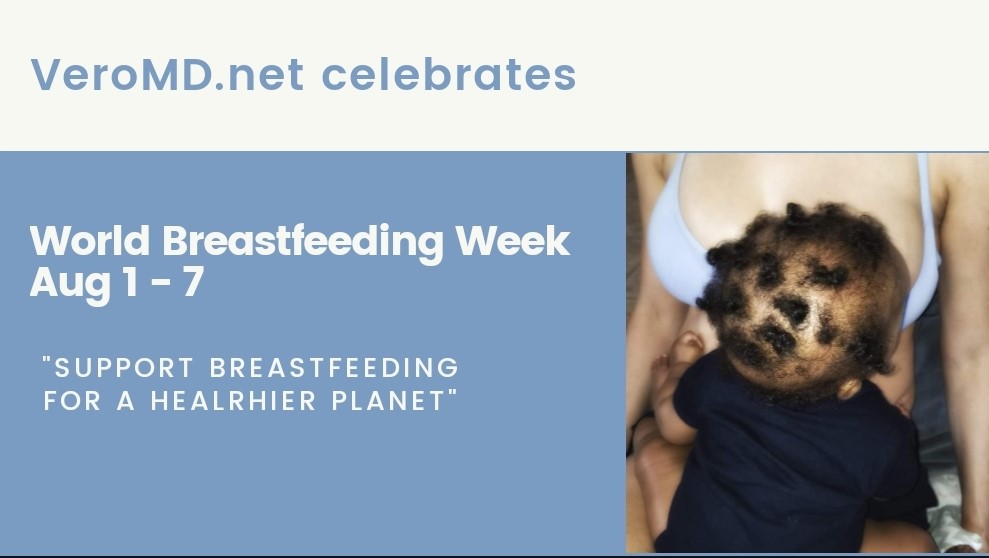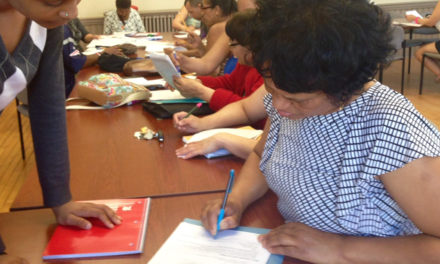Dear Dr. Vero,
I noticed on your Facebook page that this week is World Breastfeeding Week and I decided to ask you a question about breastfeeding. My mother breastfed all of her 6 kids in Cabo Verde for over one year and she never complained about it. But, in the United States, so many people are telling me that breastfeeding is hard. They tell me that there is no need to breastfeed in the U.S. because formula is just as good as breastmilk and much easier to do. However, my doctor says that breast is best. I want to do what’s best for my baby. What do you think?
Sincerely,
A Hopeful Breastfeeder

Dear Hopeful Breastfeeder,
Thank you for reaching out and following me on social media. August 1st to the 7th was World Breastfeeding Week, a time meant to raise awareness and excite people about breastfeeding, and thus, increase breastfeeding rates worldwide.
Your mom successfully breastfed 6 children in Cabo Verde during a time when the country supported breastfeeding and there was almost no other option for feeding newborns. She most likely learned how to breastfeed from other women in the family and community. She may not have worked outside of the home and was not shamed for breastfeeding in public.
The level of support and acceptance for breastfeeding in the U.S. pales in comparison to what your mother likely received in Cabo Verde. Pregnant women and new mothers in the US receive many mixed messages about breastfeeding, even though it is a natural process that most women, with proper support, should be able to accomplish.
Breastfeeding has numerous benefits to your baby. Breastfeeding can protect your baby from many viral and bacterial infections, such as ear, respiratory and urinary tract infections, and diseases such as leukemia, diabetes and childhood obesity. It can also protect your baby from Sudden Infant Death Syndrome (SIDS) and may help your child become smarter; children that are breastfed do better on intelligence tests.
Breastfeeding also has many benefits for the mom. It protects mothers from postpartum depression as well as excessive bleeding after giving birth, which is a major cause of maternal pregnancy-related death. It also decreases mom’s risk of diabetes, osteoporosis, and breast and ovarian cancers and helps her lose the weight she gained during the pregnancy. Breastfeeding can help her bond more with her baby. Furthermore, breastfeeding is probably the most environmentally-friendly food. It does not produce waste, greenhouse gases or a water footprint. Did you know that it takes 4,000 liters (1056.7 gallons) of water to produce 1 kilogram (35 oz) of substitute powdered milk?
Breastfeeding is not always easy. It often requires significant patience, effort and emotional commitment. Also, it can be painful, especially in the beginning as you learn to help your baby latch properly to the breast or when your baby’s teeth initially come out. Many mothers need support to start and continue breastfeeding. Ask your obstetrician, the hospital where you will be delivering and/or your future pediatrician for a referral to a skilled breastfeeding counselor. A lactation counselor is a trained professional that can support and advise you during your breastfeeding journey. According to the World Health Organization (WHO), “improving access to skilled counselling for breastfeeding can extend the duration of breastfeeding and promote exclusive breastfeeding, with benefits for babies, families and economies. Indeed, analysis indicates that increasing rates of exclusive breastfeeding could save the lives of 820,000 children every year, generating US $302 billion in additional income.”
The WHO recommends that mothers worldwide, including in the US, exclusively breastfeed their babies for the first six months of their lives. This can certainly be a challenge for a mother who is working full time. About 25 percent of new mothers in the US return to work only 2 weeks after giving birth. Such a short maternity leave (if you can even call it that) may not allow the mother to physically and emotionally recover enough from the process of childbirth and can grossly interfere with her ability to establish successful breastfeeding. Once at work, many women may not have enough time to pump milk regularly or may not have access to proper places to pump. However, continuation of breastfeeding while working is very much possible. For instance, I was able to breastfeed my child for 12 months while working full-time as a physician. It took a lot of coordination, creativity and dedication on my part, even though I work in a supportive environment.
To improve your chances of successfully breastfeeding, I recommend you talk to your boss about your breastfeeding plans and find time in your work schedule to pump regularly. Find out ahead of time how to use your pump, the location of the pumping room and how to safely store your breastmilk at work. Federal law requires that employers provide basic accommodations for breastfeeding mothers at work, which include time for women to pump and a private area, other than the bathroom for pumping. Talk to current and past breastfeeding mothers about their experience with breastfeeding while working. They can teach you little tricks and give you bits of information to encourage and help you be successful with breastfeeding.
Ultimately, the decision to breastfeed or formula-feed is up to you. Do not compare yourself to other women, including your mom. Instead, learn from their experiences and figure out what works for you and your family. Do not be afraid to seek help. As a physician and a mom, I encourage you to do your best to breastfeed your baby for at least 6 months given that breastfeeding has so many health and possible emotional benefits for you and your baby.
For more information about the benefits of breastfeeding, go to the American Academy of Pediatrics and the Centers for Disease and Human Development.
Good luck!
Stay safe,
To learn more about Dr. Vero, go to VeroMD.net.
The information contained in this article is not intended nor implied to be a substitute for professional medical advice, diagnosis, or treatment. It is provided for educational purposes only. Always seek the advice of your physician or other qualified health provider with any questions you may have regarding a medical condition.







Great answer and recommendations. The expectant mother asking the question might be able to find great information about breastfeeding and local support at La Leche League (https://lllusa.org/locator/). I think that starting early in educating one’s self about breastfeeding and working out a plan will be beneficial and make the experience a little less stressful when the baby arrives.